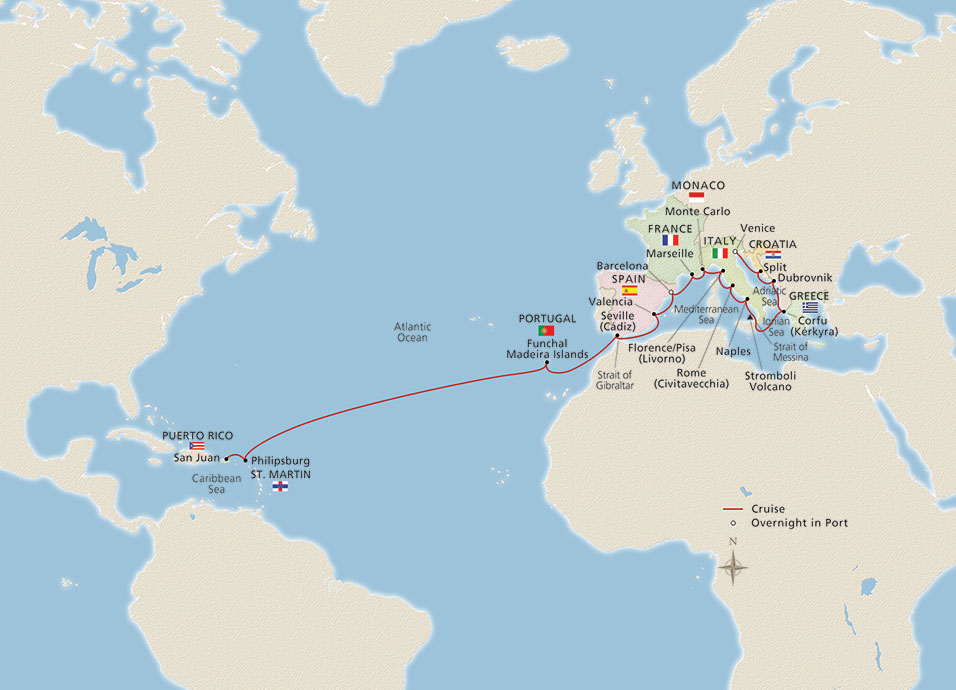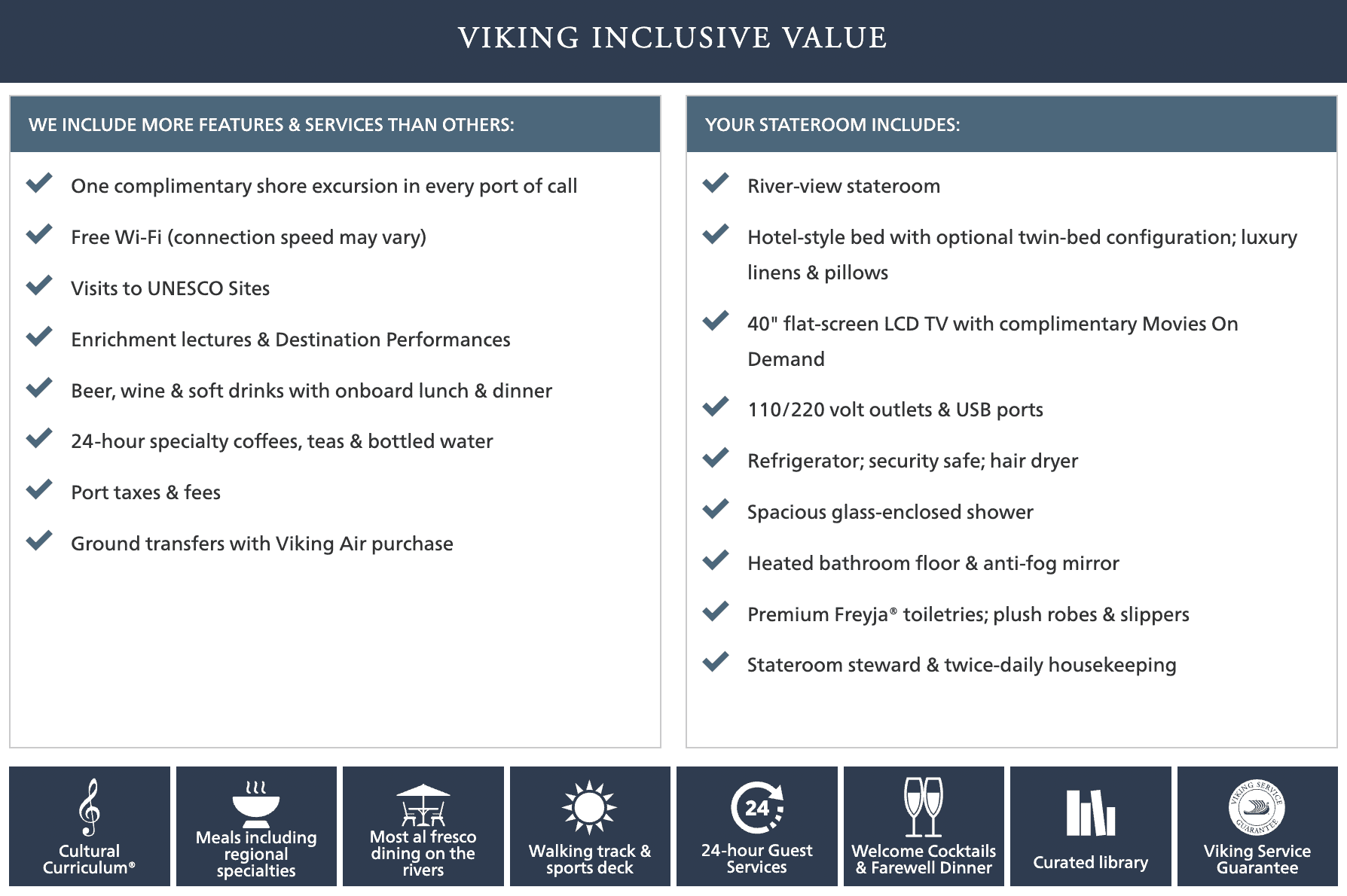Call us or email us if you have any questions.

Sail deep into the Old World
Combine West Indies to Spain and Mediterranean Odyssey for a one-of-a-kind 26-day cruise crossing the Atlantic and the Mediterranean. Uncover the colorful cultures of the Caribbean, the rich past of Spain and France, the scenic and architectural splendors of Italy, the medieval treasures of Croatia and more. Overnight stays in Barcelona and Fusina, the gateway to Venice, give you time to explore these iconic cities. This exclusive itinerary spans the ages.

San Juan, Puerto Rico / Venice, Italy
2023 Sailings on October
* Please check with us for dates & pricing
Cruise fare from $12,599.0 per person
* Please check with us for dates & pricing

Embark your ship and settle into your stateroom. San Juan is a city of white-sand beaches, lush rainforests and inspiring Spanish colonial architecture. Compact and elegantly planned, Old San Juan spans the centuries. El Morro fortress has been standing watch over San Juan Bay since the 16th century and its formidable cannons peer out to sea. The streets of the centuries-old UNESCO World Heritage Site are paved with steel-blue adoquín stone, used to ballast the Spanish galleons that brought settlers here. These colorful, narrow byways lead to picturesque multihued facades and townhouses with neoclassical balconies.
St. Martin is a fascinating mix of France and Holland and the island has been shared by the two nations since 1648. The early economy relied on cotton, tobacco, salt and sugar. A large salt pond remains, once harvested by the Dutch East India Company for trade. Today, the Dutch side of the island, anchored by its capital, Philipsburg, is dotted with resorts and casinos. The renowned Rotary Lookout Point offers stunning panoramic views of the Simpson Bay Lagoon and surrounding islands. Further north, the 1.5-mile swath of white sand at Orient Beach is ideal for sunbathing.
Sail the Atlantic Ocean, divided in half, north to south, by the Mid-Atlantic Ridge. Longer than the Rockies, the Himalayas and the Andes combined, this underwater mountain range is the longest on Earth. Enjoy the amenities of your ship as you sail. Perhaps take a breath of fresh air on a brisk walk around the Promenade Deck or begin your day with a workout in the well-equipped Fitness Center.
The island of Madeira is an enchanting Atlantic paradise. Known as the “Garden Island” for its rich agriculture, terraced hillsides and beautiful flowers, it maintains a temperate year-round climate. The island’s irrigation aqueducts, or levadas, were dug into the hillsides so that early farmers could make use of every patch of land. One of the island’s most prolific crops that has long been fed by levadas is grapes, which produce four types of Madeira wine popular around the world. In the capital and port city of Funchal, the picturesque Old Town is best explored on foot.
Sail legendary waters, where medieval Europeans believed “there be dragons” beyond the ocean’s horizon. As you sail today, savor a range of international cuisine on board. Choose from a variety of international flavors at the World Café, enjoy al fresco dining on the Aquavit Terrace, or regional specialties in The Restaurant.
Cádiz lies on Spain’s breathtaking province of Andalusia and gained incredible wealth during the 18th century; riches from the Americas were unloaded here after the Guadalquivir River to Seville silted up. This scenic southern region is home the matador and world-class equestrian art. Seville, city of polyamorous suitor Don Juan, boasts plenty of its own glories. Its grand cathedral, Alcázar Palace and Tower of Gold were built from the coffers of Spanish kings, but its fiery flamenco defines its true spirit. It is best to ponder it all while sipping sherry at a bodega.
Sail the gateway between the Atlantic and the Mediterranean. Its defining landmark, the soaring Rock of Gibraltar, was one of the Pillars of Hercules of ancient myth. As you sail, explore our well-curated library, tucked in a private alcove of The Living Room, and select from a broad range of titles. Read a book by the Main Pool, a calming oasis in any weather with its retractable roof, allowing for year-round swimming.
Valencia is steeped in 2,000 years of history and culture. Its Old Town is one of Spain’s largest, a diverse medley of ancient buildings, wide-open plazas and cultural monuments. The Gothic Silk Exchange, a UNESCO World Heritage Site, bears witness to Valencia’s Renaissance trading power. A literal taste of Valencia’s past bubbles up in every skillet of paella. The centuries-old rice dish was invented here and perfected by farmers; barracas throughout the city offer demonstrations and tastings of this famously rustic cuisine.
The vibrant city of Barcelona, with its lively culture and inviting outdoor spaces, preserves a rich history. Picturesque medieval lanes wind through the oldest part of the city, the Gothic Quarter, where remnants of the city’s Roman wall were uncovered. Its treasures include the neo-Gothic Barcelona Cathedral, the medieval Jewish district of El Call and the Romanesque Church of Santa Maria del Pi. In the evenings, diners relax in the Royal Plaza at restaurants along the elegant square’s perimeter.
Barcelona is steeped in history, with stunning architecture and a rich culture. Mediterranean breezes grace the shore and Catalonia’s capital is a feast for the senses. Long strolls on wide boulevards—such as Las Ramblas, the mile-long leafy pedestrian way, and the Passeig de Gràcia, lined with some of Europe’s most elegant buildings—set the tone for a city that moves to its own tempo. Native son and famed architect Antoni Gaudí adorned his city with whimsy, whether along fantastical city blocks or with his colossal masterpiece, the towering La Sagrada Família cathedral.
Marseille is rich in historic treasures, nestled between the Mediterranean and rocky hills of limestone. Two 17th-century fortresses dominate the charming Vieux Port, or Old Port, the natural harbor that hosts all manner of watercraft, from sleek elegant yachts to old style fishing vessels. Its picturesque quay is one of the world’s most romantic walks, lined with dozens of cafés and shops. Also worth exploring is the city center, graced by La Canebière boulevard. Linger in a café and sample the city’s signature bouillabaisse made from freshly caught fish.
The chic city of Monte Carlo in the petite kingdom of Monaco boasts some of the world’s most exclusive shopping and a beautiful old port. A fairy-tale aura has settled on this glittering city of the Grimaldi family, perhaps nowhere more elegantly than at the Prince’s Palace, where the late American actress-turned-princess Grace Kelly presided with Prince Rainier III. Monte Carlo’s medieval quarter perches on “The Rock,” an escarpment at the foot of the Maritime Alps, and offers spectacular views of the Mediterranean and the harbor lined with mega-yachts.
Tuscany is known equally as the cradle of the Renaissance and a center of culinary delights and astounding wines. Throughout this emerald-green countryside dotted with cypress trees, endless delights unfold. Among them is Florence, a living museum of the Renaissance. Brunelleschi’s famous Duomo dominates the medieval cityscape—an architectural achievement. Another Tuscan treasure, the Square of Miracles, unfolds in Pisa. Here, a trinity of masterpieces—the Leaning Tower, Pisa Cathedral and Baptistery—comprise some of Europe’s finest art and architecture.
For centuries, Rome ruled much of Europe, building a vast empire from the power of emperors. More than 2,500 years of history live in the city’s streets. Ancient structures recall those heady days when the cheers of 80,000 spectators roared from the Colosseum, citizens mingled in the Forum and senators asked the gods for guidance at the Pantheon. Along with the Vatican and St. Peter’s Basilica, this rich pocket of Italy is one of the world’s greatest repositories of history and civilization.
Naples boasts a long history in a stunning seaside setting and is known mostly for its pizza. The city has long been a major center of Italian culture and was the seat of a powerful independent kingdom for 500 years. So great was its sway that it lured the region’s finest architects and artists. In the grand Piazza del Plebiscito, the grand and sweeping public square, the San Francesco di Paola Church flaunts a colonnaded facade reminiscent of the Pantheon in Rome, and the Royal Palace overlooks Neapolitans with statues of all the kings of Naples peering out from alcoves.
Sail the gateway to the Adriatic, marked by the sole of Italy’s boot and the western coasts of Albania and Greece. As you sail today, attend an informative lecture or watch a film in our state-of-the-art theater. A range of insightful TED Talks and destination-inspired seminars are offered daily.
Corfu has a rich history shaped by conquerors and by royalty seeking tranquility. Corfu’s Old Town and Fortress—fashioned by the once powerful Venetian Republic—comprise a UNESCO World Heritage Site. Its narrow warrens lead to one of Europe’s largest public squares and a lovely promenade once exclusively reserved for the local aristocracy. Everywhere, magnificent coastal views unfold and scenic byways lead to history-rich enclaves, from the archaeological site of Paleopolis and the stunning Vlacherna Monastery to a former Greek royal villa.
Dubrovnik is a historic jewel, with its spectacular Adriatic setting, 12th-century medieval streets and incredibly preserved structures. So stunning is its Old Town, the playwright George Bernard Shaw famously called it “paradise on Earth.” It is all spectacularly surrounded by a towering medieval wall. Inside, the ancient city’s Stradun is lined with authentic stone houses. The peaceful 14th-century Franciscan Monastery and Apothecary, housing the world’s oldest working pharmacy and fine collection of Renaissance paintings, provide insight into the ages.
Built around the Roman Palace of Emperor Diocletian, Split is one of Croatia’s oldest cities. Its promenade commands majestic views over a bay and the Adriatic Sea. Despite evidence of Split’s origins in the 6th century BC, the city is traditionally considered over 1,700 years old—counting from the construction of the palace. Its well-preserved remains have been seamlessly assimilated into the modern city. An Ethnographic Museum is found at the palace’s heart and shops line the passageways of its ancient basement. Diocletian’s ancient mausoleum is now a stunning cathedral.
Chioggia is a charming fishing community steeped in its age-old seafaring traditions. It is also the gateway to Venice, famed for its wondrous patchwork of graceful piazzas, tranquil canals, artful footbridges and Gothic splendor. All things Venetian begin in St. Mark’s Square, where its elegant campanile, or bell tower, rings over the rooftops, and the Byzantine-Gothic St. Mark’s Basilica seems to preside over all. Beyond St. Mark’s and away from the crowds, Venice is a hushed and intriguing city to explore on foot, with medieval echoes marking every step.
The Venetian Republic ruled Adriatic waves for a millennium. During the 8th century as the Roman Empire began to decline, many Europeans fled to Venice and its neighboring towns, including Chioggia. Merchants put their skills to use, and the city-state was soon thriving. The Venetian Lagoon’s canal banks feature buildings influenced by Byzantine and Islamic architecture, reflecting Venice’s powerful trading network. The first vaporetto traversed the Grand Canal in 1881; alongside the gondolas, these iconic Venetian water buses are at the heart of Venice’s transport network. After breakfast, disembark your ship and journey home.
* One shore excursion included per port; all others available at an extra charge.